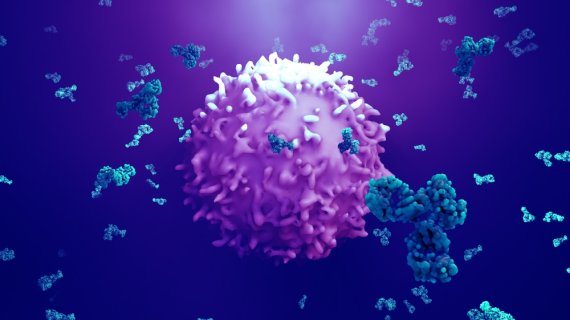Human bodies have a very advanced immune system. Intruders are tagged by antibodies, which render them harmless and then dispose of them. These specialized proteins know exactly where they need to be because they recognize the ‘fingerprint’ of the intruder (the antigen). That capability should make them the ideal couriers for medicines.
In his PhD thesis that he defended last Friday, Jorick Bruins shows that you can use antibodies to deliver medicines. You can then send cancer medicines to the scene of the crime without affecting healthy cells.
Mushrooms
Bruins attaches the medicine to a chemical compound (an alkyne) that acts as a carrier. That carrier is then conjugated (fastened) onto one of the amino acids of the antibody (using cycloaddition). That amino acid is important: it is a tyrosine at the end of the antibody’s protein chain. It needs to be oxidized first before it can react with the carrier.
This all sounds like a lot of work, but it is not in practice, Bruins explains enthusiastically. ‘All the necessary reactions can take place in one step with relatively simple resources.’ For example, the enzyme required to oxidize tyrosine is found in fungi. Bruins: ‘To prove it works, I bought a pack of mushrooms in Albert Heijn and extracted the enzyme from them.’
Perfectly
Bruins improved the efficiency of the process to such an extent that 95 per cent of the antibodies were carrying the medicine. As proof of principle, he performed the reaction with the known antibody trastuzumab, which recognizes breast cancer. That worked perfectly. In principle it should be easy to make variants, says Bruins. ‘You have just two variables: an antibody and a chemical group that you attach with the cycloaddition technique.’
Even so, an attempt to make one such antibody-medicine conjugate for leukaemia failed, much to Bruins’ annoyance. ‘The antibody didn’t pick out its target because a tyrosine is involved in how it recognizes the cancer cell’s fingerprint.’ Which turned out to be precisely the tyrosine that had been modified in the production process. A question of bad luck.
But Bruins has no doubts about the method’s potential. What is more, Bruins’ method is not just restricted to delivering medicines: you could also have targeted irradiation by attaching radioactive substances to the antibody.


 A breast cancer cell is attacked by antibodies. Photo: Shutterstock
A breast cancer cell is attacked by antibodies. Photo: Shutterstock